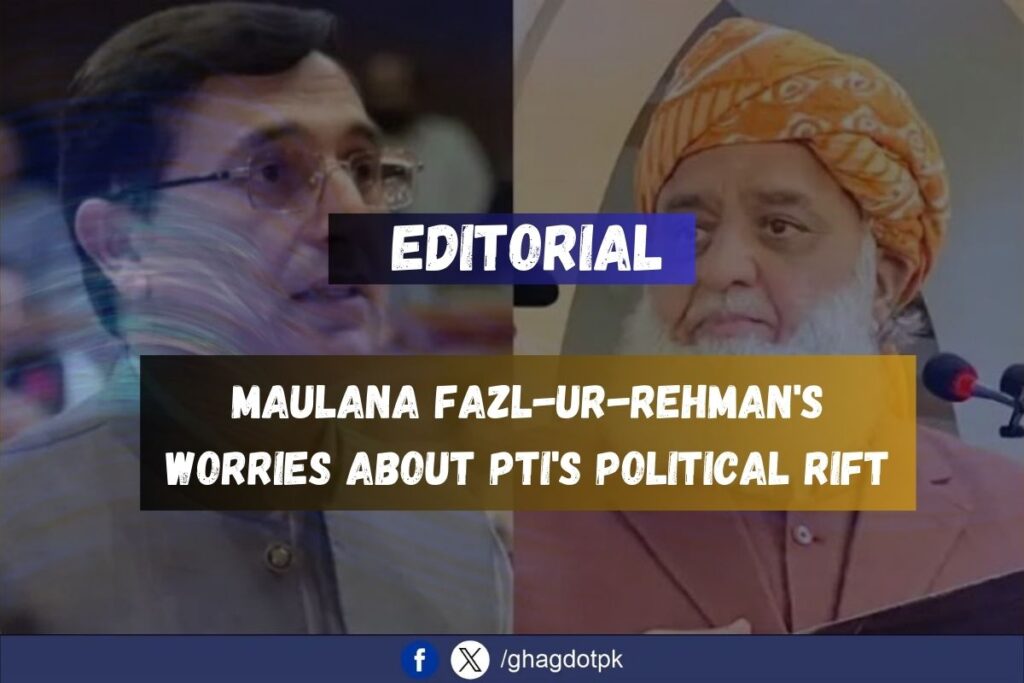Maulana Fazlur Rehman, the head of Jamiat Ulema-e-Islam (JUI), has expressed serious concerns over the worsening security situation and poor governance in Pakistan, particularly in Khyber Pakhtunkhwa. Speaking at an event in Dera Ismail Khan, he criticized the provincial government, stating that peace is elusive, and governance is virtually nonexistent. According to him, the security situation in KP, including the tribal districts, has deteriorated significantly, leaving the public with an acute sense of insecurity.
He expressed fears of a potential regional shift and questioned where Pakistan would stand if such changes occurred. Maulana reiterated that force alone cannot resolve these issues and announced plans to convene a representative jirga to assess the tribal areas’ challenges and find solutions, as the government appears indifferent to its responsibilities.
Reflecting on the nine years since the FATA merger, Maulana stated that the situation has worsened rather than improved. He criticized the government for its disconnect from public issues, particularly those related to law and order. This disconnect, he argued, strengthens the belief that the FATA merger was a mistake. He highlighted the unrest in tribal and southern districts, emphasizing that critical decisions are being made without consulting local elders or communities.
Discussing Pakistan’s strained relations with Afghanistan, Maulana stressed the interconnected nature of the two nations. He warned that ignoring the signs of regional changes would only worsen Pakistan’s challenges. He urged all stakeholders, including PTI, to prioritize dialogue and reconciliation over confrontation.
While expressing solidarity with the Pakistan Army, he emphasized the need for the military to avoid involvement in political matters, allowing institutions to function within their constitutional boundaries. According to Maulana, this separation is crucial for addressing the country’s growing crises.
Maulana Fazlur Rehman’s observations merit serious consideration, as they highlight critical challenges requiring immediate attention. His concerns about the regional outlook and governance issues underline the complexity of Pakistan’s current situation, demanding unity among political forces and stakeholders.
The situation in Khyber Pakhtunkhwa and Balochistan is particularly dire, with insurgent groups openly challenging the state and global proxies exploiting vulnerabilities in these sensitive provinces. Despite this, the provincial governments’ performance and priorities remain far from satisfactory.
A stark example of this misgovernance is the unresolved abduction of government employees by the outlawed TTP in Lakki Marwat two weeks ago. Civil society and political organizations have announced protests from Monday, yet the provincial government remains silent. Although the TTP released one abductee on humanitarian grounds after requests from local elders, the government’s inaction is troubling. Constitutionally, the provincial administration is responsible for resolving such crises, yet it has chosen to remain passive.
The KP government appears preoccupied with internal disputes and confrontations with the federal government. On Saturday, PTI’s central leadership replaced Chief Minister Ali Amin Gandapur as the party’s provincial president with MNA Junaid Akbar Khan, signaling internal discord. These conflicts make it unrealistic to expect the current government to restore peace or focus on reconstruction in the province.
It is imperative for the federal government, military leadership, and moderate political forces to play their roles in addressing these challenges and steering the country out of its crises. Blame games and lamenting the past will only deepen the chaos. Collaborative efforts and a unified vision are essential to overcoming the multifaceted challenges Pakistan faces today.






